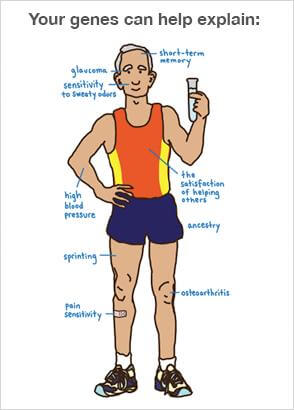Back in October, 23andMe generated a little PR buzz by examining the genetic codes of 100 current and former NFL players and comparing them to non professional athletes. That genome wide association study (GWAS) didn’t actually turn up any remarkable results. Yet the GWAS wasn’t the first or last of 23andMe’s attempts at determining how genetics shapes athletics. Their SNP tests include examinations for key gene variants which may code for muscle growth and sprinting prowess. They have an associated study to find genes linked to sports injuries. Teaming up with the National Senior Games Association, 23andMe is offering discounts to older athletes who get tested and submit athletic surveys. They even offered free testing at the Palo Alto Senior Games (see page 15 of this pdf). No doubt about it, 23andMe is taking strides to understand the genetic variations that help some become athletic stars and force others to sit on the bench.
23andMe has made throwing DNA studies at a topic of interest into something of a hallmark for the company. They’ve worked hard collecting samples for an extensive test on Parkinson’s Disease. Likewise, they’ve begun a “research revolution” aimed at letting users determine which diseases will receive the benefit of their ever growing DNA sample collections. The NSGA study shows that 23andMe is at it again, focusing on what helps us age gracefully and athletically. The work also suggest that 23andMe is actively throwing its weight behind learning about the key genetic ingredients for athleticism at all ages.

I’d like to thank Daniel MacArthur of Genetic Futures for providing great insight into the NFL GWAS and Palo Alto Senior Games study. He points out that the NFL study was simply too small to really generate any meaningful correlations between gene variants and athleticism. 100 samples, even of outlier athletes, isn’t enough. However, MacArthur also points out that the thousands of samples taken for the NGAS study, and other 23andMe endeavors (i.e. the Parkinson’s study) could yield major insight.
What that insight will be is unclear. While a few genetic variants, such as a mutation in the ACTN3 gene, may provide an edge for athletes it’s unclear how big of a factor genes are in determining your physical prowess. As I was recently informed by Malcolm Gladwell’s book, Outliers, the greatest determinant for your success in a sport may be the month in which you are born (due to asymmetry in training over a lifetime). A host of genetic variants that give you a 15% better chance at naturally stronger muscles or a more resilient cardiovascular system may be small compensation for breaking your leg at age nine and choosing to pursue writing over track and field. It’s hard to know if/when/how genetics will trump experience when it comes to something as broad as athleticism.
Still, all things being the same, your genes are likely to form an important part of your athletic potential. Understanding that potential could not only help us compensate for our bodies’ natural tendencies it could lead to treatments for those with debilitating illnesses. Already, we’ve seen scientists pursue gene therapy to harness some of the incredible strength benefits of myostatin blockers in order to help fight muscular dystrophy. With companies like 23andMe discovering new genetic variants linked to life-long athletic talent, we may one day see therapies that could ramp up anyone’s athletic potential to match that of the beefiest NFL line backer.
[image credit: 23andMe]



